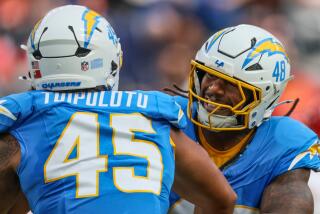Commentary : Chargersâ Kellen Winslow Is a Winner Who Would Never Quit
I remember the towel draped over his head. I remember his arms hanging limp on supporting shoulders. I remember the drained look on his face.
I remember Jan. 2, 1982.
I remember that Kellen Winslow would not quit.
I remember that the Chargers were 41-38 winners over the Miami Dolphins on that long afternoonâs journey into night. I remember that they were winners because Kellen Winslow would not quit.
If that performance was not a profile in courage, it was at least a most magnificent display of determination and perseverance.
I remember the heat and the humidity and I remember Winslow catching 13 passes for 166 yards, but I remember his most important contribution came on special teams when he went skyward to block a Miami field goal attempt in the final seconds of regulation. Thus energized, the Chargers eventually won in overtime.
And now I hear that Kellen Winslow is a quitter. I hear that Kellen Winslow is a malingerer. I hear that Kellen Winslow is dogging it.
None of this was actually said, but that was what I heard.
It has to do with the manner in which the Chargers announced Monday that Kellen Winslow was no longer a member of the team.
No, he was not traded, though this organization has shown no reticence in the past to trade its heroes in the twilights of their careers. Remember Lance Alworth?
No, he was not waived, as ignominious an ending as that would have been.
It was worse.
He was suspended.
Suspended?
âThe discipline deals with a refusal to play for the club,â the statement read. âIndications are that this entire matter is going to be subject to litigation. On advice of counsel, the Chargers will make no further comment.â
It is amazing how the English language can be vague and precise at the same time. Since the statement says this man is being suspended for refusing to play, it can only mean that the organization feels that he should be playing. If he should be playing and wonât, that makes him a malingering quitter.
Clear enough?
It is to me.
Except I donât believe it.
Letâs flash back to another memory of Kellen Winslow.
The date was Oct. 21, 1984. After catching a simple pass over the middle, a catch he had made hundreds of times in practice and games, he took a hit to the side of his knee from the Raidersâ Jeff Barnes and went down.
I remember the agony as he writhed on the turf. I remember doctors saying that repairing the damage was like sewing two mops together. I remember thinking that this man might never again play football.
He was back almost a year to the day later, after making what the Charger media guide called âa long a painful journey through rehabilitation.â
This man is a quitter?
Winslow was never again the force he was before that injury, but it was amazing that he was playing at all. However, he still played well enough in 1987 to play in his fifth Pro Bowl. Whatâs more, his teammates voted him the Chargersâ offensive player of the year.
So what has happened since then?
More arthroscopic surgery. More trauma to a traumatized knee. It might have been deemed a housekeeping procedure . . . on any knee other than this one.
When it came time to report for preseason practice, Winslow at first flunked and then passed the physical. This obviously was not the knee of a Clydesdale, but Winslow said doctors told him it was sound enough to âget by.â
What it got him was an appearance in one exhibition game, and Winslow decided that was enough.
Now we get to the ugly part of the scenario.
The club, citing the fact that he had passed his physical, wanted him to play.
Winslow, complaining of the pain, did not want to continue.
Why would the club want him to continue? I suspect it had to do with his $795,000 contract being guaranteed. It could avoid paying that money if Winslow retired.
The clubâs suggested solution was that he quietly retire at half-salary. It is understandable that this was not acceptable to him. After all, pain was a price he had been paying and will continue to pay . . . and that injury was inflicted and undoubtedly aggravated in the line of duty.
What to do?
He could go all out and play and take a chance on suffering a crippling injury. If that happened, of course, he could probably successfully sue owner Alex Spanos for about four apartment buildings . . . and then retire to life in a recliner.
He could play at less than full speed, tiptoeing through the mine fields of National Football League secondaries. Of course, that would have been dogging it.
What he did seemed to be the sensible thing. He insisted he was not fit to play.
What he did not count on is that this would give the club the escape clause it needed. He did not count on being suspended without pay. He did not count on being portrayed as a malingerer, when that was what he would have had to become if he had continued.
Kellen Winslow made the mistake of forgetting that fleas have bigger hearts than the National Football League . . . and the Charger organization is no exception.


